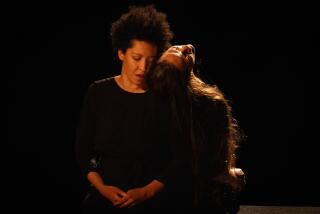Shallow Evening With Diana Ross
SAN DIEGO â Hereâs a question that nags one while watching Diana Ross perform: How good could she be by now if she had long ago shucked the cosmic-glamorpuss jive and dedicated herself to the craft of singing? One guess: very good, judging from the true emotion and genuine style that occasionally fizz to the surface of her âchampagne soul.â
A guess will have to suffice, however. In her concert Thursday night at the Starlight Bowl, Ross gave notice that she intends to remain the queen of artifice, a performer who doesnât really sing so much as burp up itty-bitty bubbles of song as an excuse to model expensive clothes for the peasants. Sartorial noblesse oblige.
On a stage decorated with color-lighted isosceles triangles and backed by a serviceable nine-piece band and three vocalists, Ross toured the byways of a career that has produced a great number of hits. But for a new tweak here and a tuck there, it was a virtual re-creation of her performance several years ago at the Sports Arena.
She did a Supremes medley (âWhere Did Our Love Go?â âBaby Love,â âStop! In the Name of Love,â âYou Canât Hurry Love,â âYou Keep Me Hanginâ Onâ) and selections from her collaborations with Lionel Richie (âEndless Loveâ), Bernard Edwards and Nile Rodgers (âUpside Down,â from her who-says-I-canât-be-funky period), and Ashford-Simpson (âAinât No Mountain High Enoughâ).
She sang songs from her films âMahoganyâ (âDo You Know Where Youâre Going Toâ) and âLady Sings the Bluesâ (âThe Man I Loveâ); from her flirtation with disco (âLove Hangoverâ); and from her newest release, âThe Force Behind the Powerâ (âWhen You Tell Me That You Love Me,â âChange of Heartâ). She covered an âoldieâ (âWhy Do Fools Fall in Loveâ) and bopped her way through some straight jazz (âI Cried for Youâ).
She did all this and a bunch more in less than 90 minutes, while floating on and off stage for quick costume changes. Was something sacrificed in the process, you ask? You bet. Ross rarely sang an entire song.
When she did, as on a lovely reading of Stevie Wonderâs âBlame It on the Sunâ or on Billie Holidayâs âGod Bless the Child,â one glimpsed Rossâs true potential--that of a maturing torch-pop singer. She might be from the Detroit projects, but Ross lost whatever âstreetâ sense she might have had 30 years ago; her age (47) and her acquired inclinations toward refinement and the lush life--tempered by her lack of luck on the love front--make her perfectly suited to sing adult pop songs about adult themes.
But Ross is blessed/cursed with looks and a figure that will enable her to indulge in the ingenue hokum indefinitely, and that indulgence is giving her performances the taint of self-parody. Her âconcertsâ have become fashion shows with musical interludes.
On Thursday, she kept a less-than-capacity audience in a state of suspended anticipation with a program that relentlessly teased without delivering the goods. Whenever people found themselves reacting to the opening lines of a favorite song, they just as quickly found themselves applauding its conclusion.
For the most part, the audience seemed disengaged, and rightly so. The only times people rose to their feet were when Ross coaxed them with shameless ploys, such as venturing into the crowd to sing (twice) or striking one of a catalogue of get-a-load-of-me poses seemingly borrowed from the Follies Bergere.
As diverting as this bunk might be for a couple out for an evening of light entertainment, it mocks the notion of âconcert.â When artist and audience both get caught up in such extraneous froufrou--nail-biting over whether sheâll wear the black flouncy number next, or the slinky gold-sequined thing, or the multilayered, Scarlett OâHara gown--the music invariably suffers. Rossâs songs never anchored long enough to soak past the surface to the soul. With a few exceptions, this concert was a study in superficiality.
It was also an exercise in barely disguised petulance. Ross, a notorious fussbudget, opened her show by announcing she had never before had to do battle with planes flying overhead. Veteran trouper that she is, she seemed completely unnerved by the behemoths on a couple of occasions. By mid-show, of course, one was pulling for the 747s.
Later in the program, she chastised her backup singers--in mid-song--for âsinging too loud.â While introducing the ballad âWhen You Tell Me That You Love Me,â Ross even employed the Imperial We.
âWe donât like the bright lights on the side because they hurt our eyes,â she purred-sneered to the light technician. Near the close of the show, during the fade-out ending of âEndless Loveâ--before doing a brief version of âThe Force Behind the Power,â before soliciting people to stand and sway for her signature touchy-feely song, âReach Out and Touch (Somebodyâs Hand)â--she encored the Imperial We.
âWe love you,â she said, âand we hope to see you again.â
To which oneâs only possible response was, âI love we, too, Diana, but not on your life.â
More to Read
The biggest entertainment stories
Get our big stories about Hollywood, film, television, music, arts, culture and more right in your inbox as soon as they publish.
You may occasionally receive promotional content from the Los Angeles Times.










